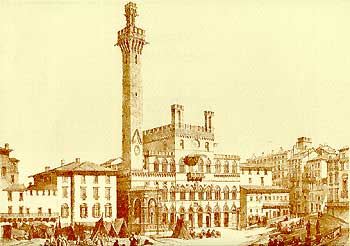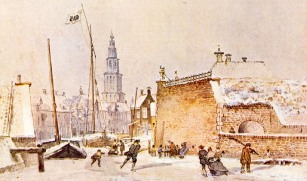|
This workshop is about the analysis of longitudinal, group-centered network data by way of stochastic, actor-based models (Snijders, van de Bunt & Steglich, 2010), and about the analysis of peer influence processes taking place in such dynamically changing networks (Steglich, Snijders & Pearson, 2010). Objective of the workshop is that course participants develop an understanding of the models, and familiarise themselves with the use of the RSiena software for model estimation. Researchers who are in the process of collecting or analysing own longitudinal data sets are especially welcome to participate.
Since 2005, Tom Snijders and the developers' team of the SIENA software for longitudinal social network analysis have been teaching courses in Groningen/Netherlands, where the research lab is located that gave birth to this data analysis tool. For these workshops' overview page, click here.
On this page you find the programme and course material of the 2012 workshop, which will again take place in the university's Academy Building in the city centre of Groningen. Sessions generally start at 9:00 and end at 17:00, with an ample lunch break from 12:30-14:00. Teachers in 2012 will be Christian Steglich, Filip Agneessens, Marijtje van Duijn and Mark Huisman.
An overview of the workshop participants, with short biographical sketches, can be found here: Participants2012.pdf.
  Preparation before the course Preparation before the course 
Course participants are expected to bring their own laptop to the course, with the R
software and some R packages pre-installed. Instructions for this are given right below.
The operating system on the laptops can be Windows (32 or 64 bit), Linux, or Mac OS;
in principle, all software we will work with is designed for platform-independence.
Please follow these steps for getting started with network analysis in R:
1. Install R on your computer; see http://www.r-project.org/
2. Start R while you have an internet connection.
3. Install the course-relevant R packages:
• open this script in a text editor,
• copy all text, and
• paste it into the R console window.
This should install the R packages 'network', 'sna', 'igraph', 'coda',
'ergm', 'RSiena', and 'RSienaTest'.
4. Also install the visone software for visualisation on your computer;
see http://visone.info/.
It also is a good idea to already download the course material posted below. There will
be changes of some material, but most of it will be used as it is available now.
  Monday, Room A2, Academy Building (1111), Broerstraat 5 Monday, Room A2, Academy Building (1111), Broerstraat 5 
We open around 9:00 with a walk-in welcome, at 9:30 the lessons will start.
1. Introduction to social network analysis: slides (Agneessens)
2. First lab exercise (general R features & sna package): Intro Sna.txt
- lunch break -
3. Statistical inference for social network data: slides (Steglich)
4. Lab exercise on inference: lab-inference.zip
5. Modelling network dynamics (part 1): slides (Steglich)
  Tuesday, Room 1313.309, Harmony building (1311), Oude Kijk in't Jatstraat 26 Tuesday, Room 1313.309, Harmony building (1311), Oude Kijk in't Jatstraat 26 
1. Dynamic network visualisation with the visone software (Agneessens / Steglich)
2. Modelling network dynamics (part 2): slides continued from Monday (Steglich),
and data + R-script for doing the analysis reported in the slides
3. Lab exercise: sex segregation of friendship networks
4. Lab exercise: hierarchies in friendship networks
- lunch break -
5. Handling missing data & changing node sets: slides (Huisman)
6. Lab exercise: handling composition change in networks
Starting to work on own data and/or assignments.
7. Utility: data conversion into RSiena usable format
On Tuesday evening, we plan a joint dinner (at own expenses) in Humphrey's Restaurant.
  Wednesday, Room A7, Academy Building (1111), Broerstraat 5 Wednesday, Room A7, Academy Building (1111), Broerstraat 5 
1. Modelling the co-evolution of networks & behaviour, and peer influence: slides (Steglich),
and data + R-script for doing the analysis reported in the slides
2. Lab exercise: co-evolution of friendship and alcohol consumption
3. Multiplexity (Agneessens): R-script
4. Lab exercise: analysis of multiplex networks
- lunch break -
The afternoon is reserved for work on own data and/or assignments.
  Thursday, Room 1314.0026, Harmony building (1311), Oude Kijk in't Jatstraat 26 Thursday, Room 1314.0026, Harmony building (1311), Oude Kijk in't Jatstraat 26 
1. Lab exercise: Model selection / goodness of fit
2. Different data types: slides (Steglich)
3. Lab exercise: two-mode network analysis
4. Lab exercise: analysis of undirected networks
- lunch break -
5. Lab exercise: multi-group analysis
In the afternoon more time for work on own data and/or assignments.
  Friday, Room A901, Archaeology building (1134), Broerstraat 9 Friday, Room A901, Archaeology building (1134), Broerstraat 9 
In the morning, we address stochastic models for single observations of social networks.
1. Dyad independence models (p1, p2, SoReMo): slides (van Duijn)
2. Dyad dependence modelling (ERG models): slides (van Duijn / Steglich)
3. Lab exercise: exponential random graph modelling
- lunch break -
The afternoon is reserved for presentations of own work & wrapping up.
  Resources Resources 
> Siena website and
RSiena manual
> StOCNET User group
> rsiena-help e-mail discussion list
> R project webpage
> visone webpage
> Pajek Wiki
|





